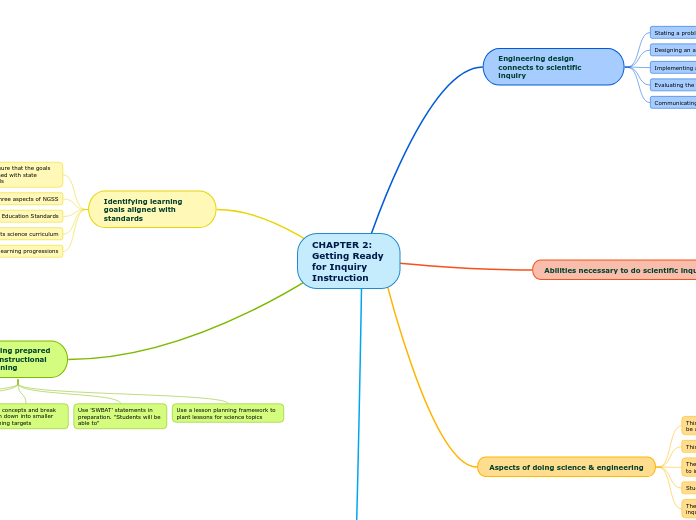CHAPTER 2: Getting Ready for Inquiry Instruction
Identifying learning goals aligned with standards
Making sure that the goals are aligned with state standards
Involving the three aspects of NGSS
Following the National Science Education Standards
Use the districts science curriculum
Develop unit-level learning progressions
Getting prepared for instructional planning
Use appropriate instructional learning strategies, methods, and concepts
Make sure that there are clear learning goals
Take concepts and break them down into smaller learning targets
Use 'SWBAT' statements in preparation. "Students will be able to"
Use a lesson planning framework to plant lessons for science topics
Engineering design connects to scientific inquiry
Stating a problem
Designing an approach
Implementing a solution
Evaluating the solution
Communicating about the problem, design, and solution
Abilities necessary to do scientific inquiry
Asking questions
Planning and conducting investigations
Gathering and analyzing data
Developing data-based, evidence-based explanations
Communicating about investigations
Aspects of doing science & engineering
This area should specify more about what the students should be able to do when problem solving
This should capture their interest and involve hands on activity
The students will develop science process skills and know how to involve themselves in the lesson
Students will engage in various types of investigations
The students will also acquire the abilities to do scientific inquiry
Using resources to develop storylines
Start by deciding what to teach, and then think about how to teach
Develop relationships between a lesson in the unit, activities and learning goals
Use resources that are available for you to decide what to teach
Through the use of a unit plan storyline framework, lesson searching and planning will get easier
Make sure to involve all three areas of the NGSS guidelines
